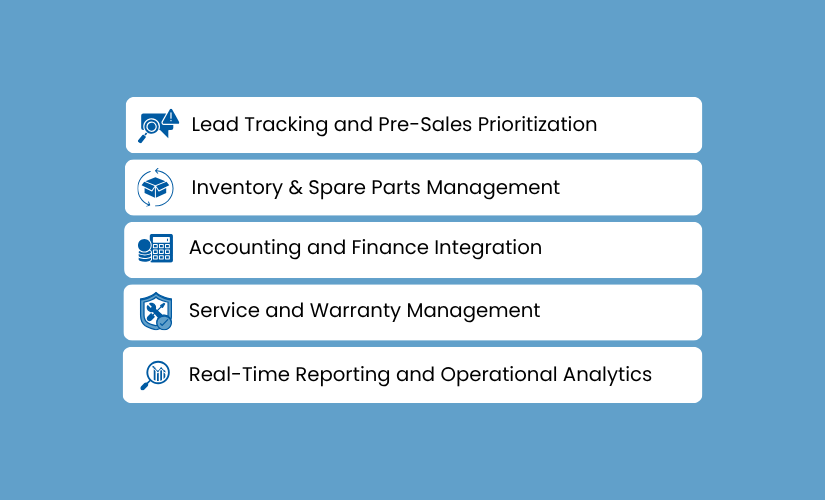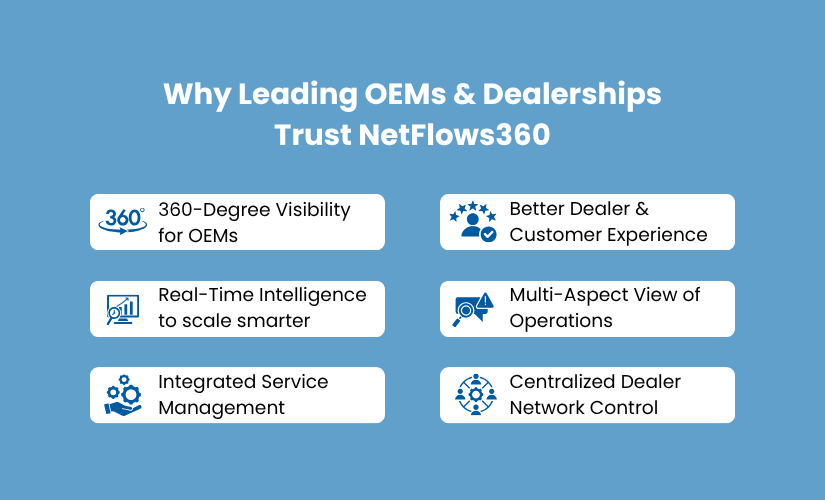India’s auto industry is on track to hit $300 billion by 2026, driven by rising vehicle demand and a growing need for digital tools.
Source: IndBizPassenger/ commercial vehicle manufacturers and farm equipment & agri vehicle manufacturers are a big part of this growth, but they’re also facing more complexity. Managing EV sales, tractor servicing, or rural spare parts is no longer simple. You need systems that keep up.
That’s why choosing the right dealer management system matters.
A modern dealership management system helps OEMs and dealers run smarter, from tracking inventory to handling billing and service. The right dealer management system software isn’t just about automation. It’s about control, visibility, and scale.
This article explores how to choose the best dealer management system for EVs, what to look for in a reliable dealer inventory management system for agri equipment, and how to automate dealership operations for long-term success in the automotive space.
What is a Dealer Management System?
A dealer management system (DMS) is a software that brings all dealership tasks into one place. It helps manage things like:
- Keeping track of vehicles and spare parts in stock.
- Selling tractors and EVs to customers.
- Scheduling repairs and maintenance.
- Talking to customers and keeping them happy.
For tractor and EV dealerships, a DMS is very important because these vehicles are big, expensive, and need special care. A software for dealership management makes work faster, reduces mistakes, and helps dealers serve customers better.
For example, if a customer wants to buy a tractor, the DMS helps the sales team track the customer’s details, show available tractors, and close the sale quickly. If an EV needs a battery check, the DMS schedules the service and tracks the parts needed. This makes everything smooth and efficient.
Why is a DMS Important for Automotive OEMs?
The vehicle industry is changing fast. Customers want quick service, and dealers need to work smart to make money. A dealer management system automotive tool helps in many ways:
- Saves Time: It automates tasks like making bills, tracking stock, and scheduling repairs, so dealers don’t waste time on manual work.
- Better Decisions: It gives data about what customers buy and what’s in stock, helping OEMs & their dealerships to make data-driven decisions.
- Happy Customers: It helps dealers talk to customers, schedule services, and solve problems fast, making customers happy.
- Follows Rules: It ensures dealer networks follow industry rules, avoiding fines or legal issues.
Without a DMS, dealerships might face problems like lost sales, wrong stock counts, or unhappy customers. A good dealer management system software is like a helper that keeps everything organised.
Key Features of a DMS for Tractor & EV OEMs

A dealer management system is a must for tractor and EV dealerships because they deal with big machines and complex parts like EV batteries. Here are the key features that make a DMS so helpful:
Inventory Management
Tractor and EV dealerships have lots of vehicles and spare parts to manage. For example, tractors need spare parts like tyres or blades, and EVs need batteries and motors. A DMS helps by:
- Showing what’s in stock and what’s sold.
- Tracking spare parts for repairs.
- Warning when stock is low so dealers can order more.
This keeps the dealership running smoothly and ensures no customer leaves because a part or vehicle is missing.
Sales Features
Selling tractors or EVs is not like selling small items. These are expensive, and customers take time to decide. A DMS helps sales teams by:
- Keeping track of customer details and leads.
- Showing which customers are ready to buy.
- Helping sales teams follow up with customers on time.
For example, if a farmer wants a tractor, the DMS reminds the sales team to call them and share details. This makes the sales process faster and helps dealers sell more.
Accounting and Finance
Money-related issues are very important for OEMs. Without a good system, dealers might make mistakes in bills or lose track of payments. A DMS helps by:
- Creating bills automatically.
- Keeping all money records correct and updated.
- Reducing mistakes in accounting.
This ensures dealers know exactly how much money they have and avoid problems with taxes or audits.
Service and Warranty Management
Tractors and EVs need regular repairs and maintenance. For example, an EV’s battery might need a check-up, or a tractor might need a new part. A DMS helps by:
- Tracking the repair history of each vehicle.
- Managing warranty claims for free repairs.
- Scheduling service appointments for customers.
This makes repairs faster and keeps customers happy because their vehicles are fixed on time.
Reporting and Analytics
A DMS gives dealers reports to understand their business better. These reports show:
- Which vehicles are selling the most?
- What customers like or complain about.
- How much stock is left and what to order.
With these reports, dealers can make smart decisions, like ordering more popular vehicles or improving customer service.
NetFlows360 is a great automated dealer management system tool. It uses AI to give real-time data, helping dealers manage stock, sales, and repairs easily. It’s perfect for tractor and EV dealerships looking to grow.
See How NetFlows360 Can Transform Your Tractor & EV Dealership!
How to Choose the Best Dealer Management System in 2025
For OEMs, choosing the best dealer management system is a big decision. Here are some things to think about to pick the right one for your dealership network:
1. Scalability
Your dealership network might grow, with more locations or staff. The DMS should handle this growth without slowing down. For example, it should manage more tractors or EV parts as your business expands.
2. Easy to Use
The DMS should be simple so your dealer teams can learn it quickly. A complicated system will confuse staff and cause mistakes. A user-friendly DMS saves time and makes work easier.
3. AI Features
A DMS with AI can predict what customers want, suggest repairs, or manage stock better. For example, it can warn when an EV battery needs service or when tractor parts are low. AI makes your dealership network smarter and faster.
4. Works with Other Systems
Your dealership network might already use software for accounting or customer management. The DMS should connect with these tools to avoid extra work. For example, it should link with your billing software to make invoices automatically.
5. Cloud-Based or On-Premises
Cloud-Based DMS: This type of system works using the internet. You don’t need to install anything on your computer. You can log in from any place, like your office, home or even when you are travelling. It is very helpful if you have more than one showroom or workshop.
The software gets updated by itself, so you always use the latest version. But it needs a good internet connection to work well. You also have to pay every month or every year to keep using it.
On-Premises DMS: This system is installed on your office computers or your own server. You keep full control of your data and where it is saved. It does not depend on internet speed, so it works even if there is no connection. Some dealers feel this is safer.
But it needs more setup. You must have IT staff to install it, update it and fix it when there is a problem. It costs more in the beginning, but you do not need to pay every month.
Choose what works best for your dealership’s needs.
6. Mobile Access
Many dealers work in the field, like visiting farms or EV charging stations. A DMS with mobile support lets your dealer team check stock, schedule repairs, or talk to customers from anywhere.
7. Cost and Value
Don’t just choose the cheapest DMS. A low-cost system might not have good features or support. Check if the DMS saves time, improves work, and helps your business grow. The value it gives is more important than the price.
8. Customisation
Every dealership network is different. A good DMS should let you change it to fit your needs, like tracking tractor parts or EV batteries in a way that works for you.
Mistakes to Avoid When Choosing a DMS
- Complicated System: A hard-to-use DMS will make your dealer team frustrated and slow.
- Choosing Only by Price: A cheap DMS might not have good features or support, costing you more later.
- Not Asking Your Team: Involve your sales, service, and parts teams to pick a DMS that works for everyone.
- Rushing the Choice: Test the DMS, try demos, and ask questions before deciding.
Top Dealer Management Systems to Consider in 2025
Here are some of the best dealer management systems for OEMs in 2025:
1. NetFlows360
This is an AI-powered dealership management system software made for Indian OEMs. It gives real-time data and full control over your dealership network. It’s perfect for managing tractors and EVs.
Get Started with NetFlows360!
2. Dealertrack DMS
A cloud-based system that’s easy to use. It’s great for managing stock and customers and connects with other Dealertrack tools.
3. TechnoSoft Automotive DMS
This system can be customised for growing dealerships. It helps with sales, stock, and customer management.
4. Eazy DMS
A simple and affordable DMS for Indian dealerships. It’s great for sales, stock tracking, and repairs.
5. EverLogic
This DMS automates repairs, parts, and sales. It has strong reporting tools to help dealers track their business.
Why Choose NetFlows360?

NetFlows360 is the best dealer management system software for Indian tractor and EV dealerships. Here’s why:
- Full View of Dealerships: Monitor sales, inventory, service activity, and performance across your entire dealership network in real time.
- Central Control: Manage all your dealership networks from one place for quick decisions.
- Smart AI Insights: AI helps you make better decisions, like ordering stock or planning repairs.
- Multi-Aspect View: Multi-aspect view of Sales, service, spares & inventory and claims all under one unified system.
- Better Customer Service: Keep customers happy with easy communication and fast.
- Service Management: Handle spares, warranties, and in one system for faster service.
See NetFlows360 in Action – Book a Free Demo!
Future of Dealer Management Systems in 2025 and Beyond
Dealer management systems are getting smarter. In 2025 and beyond, you’ll see more AI, machine learning, and predictive tools built right in. For OEMs, that means better visibility across the dealer network, smarter inventory control, and faster, more personalized service.
To stay ahead, you need a dealer management system that’s built for how dealerships actually work. That includes real-time data, easy integrations, and tools that help your dealer teams make better decisions every day.
NetFlows360 is designed for OEMs who want more from their dealership management system software more control, more insight, and more flexibility. It helps you automate the complex stuff so your dealers can focus on what matters: the customer.
See it for yourself. Book a free demo and find out how NetFlows360 can power your dealership network.
Frequently Asked Questions(FAQs)
Yes, a dealer management system tracks stock, sales, and vehicle availability in real-time.
Cloud-based is flexible and easy to access. On-premises gives more control over data. Choose what suits your dealership network.
Look for scalability, ease of use, AI features, and integration with your current systems.
Yes, most DMS systems use strong security, such as encryption, to keep data safe.
Yes, an AI-powered DMS can monitor battery health and suggest maintenance for EVs.
A DMS schedules tracks service history, and manages warranties for tractors and EVs, making service faster and better.
